The Sachsenhausen Concentration Camp Memorial Tour in Berlin offers a profound and somber exploration of one of the most notorious Nazi camps. Established in 1936, the camp held political prisoners, resistance fighters, and those targeted by the regime, who faced brutal conditions, forced labor, and medical experiments. Visitors can witness the grim reality of the camp by touring the prisoner cells, guard towers, and other significant sites, honoring the memory of the thousands who suffered and perished under the oppressive control of the Third Reich. The tour provides a chilling, yet necessary, lens into this dark chapter of history, leaving a lasting impression on all who venture to uncover its harrowing tales.
Key Points
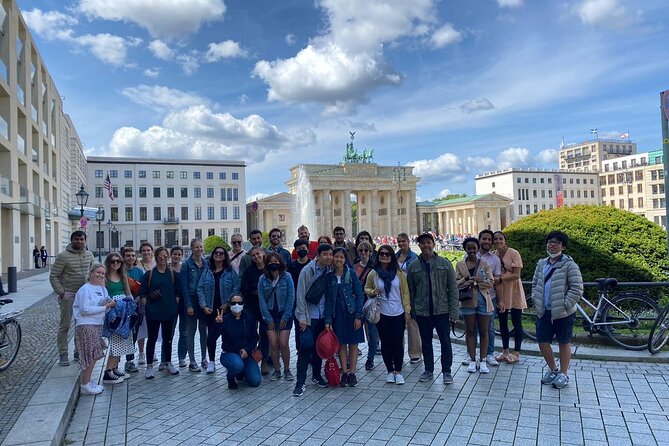
- The Sachsenhausen Concentration Camp Memorial Tour provides visitors with a poignant exploration of the camp’s dark history and the atrocities committed by the Nazi regime.
- The tour allows visitors to witness the harsh living conditions, forced labor, and inhumane medical experiments endured by the camp’s prisoners.
- Key sites within the camp, including the prisoner cells and guard towers, offer visitors a glimpse into the oppressive control and suffering experienced by the inmates.
- The tour highlights the importance of remembering the victims and honoring their memory, fostering a deeper understanding of the dangers of intolerance and the significance of human rights.
- The tour meeting point is at the Generator Berlin Alexanderplatz, and a small donation of €3 per person is required to help maintain the memorial site.
Overview of Sachsenhausen Camp
Sachsenhausen Concentration Camp was a notorious Nazi camp located in the Berlin area, serving as the main concentration camp for the region.
Established in 1936, the camp held political prisoners, resistance fighters, and eventually Jews and other groups targeted by the Nazi regime. Prisoners faced brutal living conditions, forced labor, and horrific medical experiments.
Key sites within the camp included the prisoner cells and guard towers, which visitors can explore on the tour.
Today, the Sachsenhausen Memorial honors the thousands who suffered and perished here, providing a poignant reminder of the camp’s dark history and the atrocities of the Third Reich.
You can also read our reviews of more tours and experiences in Berlin.
Exploring the Camp’s History
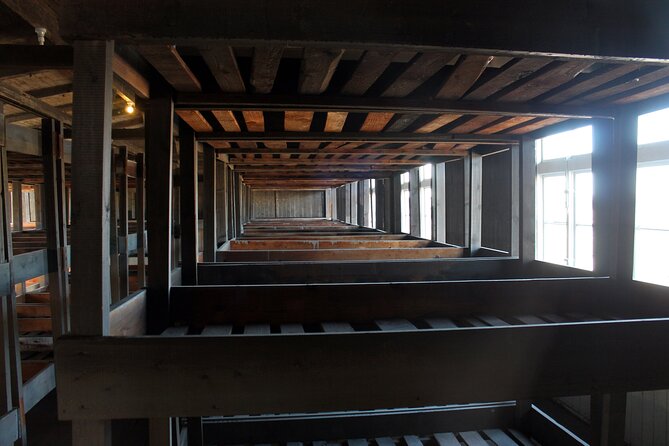
The camp’s history reveals the horrific treatment and suffering of its prisoners, who were subjected to brutal living conditions, forced labor, and inhumane medical experiments under the Nazi regime.
Sachsenhausen was established in 1936 and became one of the main concentration camps in Germany, serving as a model for other camps. Tens of thousands of prisoners, including political opponents, Jews, and other minorities, were imprisoned, tortured, and murdered at Sachsenhausen.
The tour explores the camp’s chilling past, allowing visitors to bear witness to the atrocities committed and honor the memory of those who perished. By understanding this dark history, visitors can reflect on the importance of human rights and the dangers of intolerance.
Prisoner Experiences and Stories
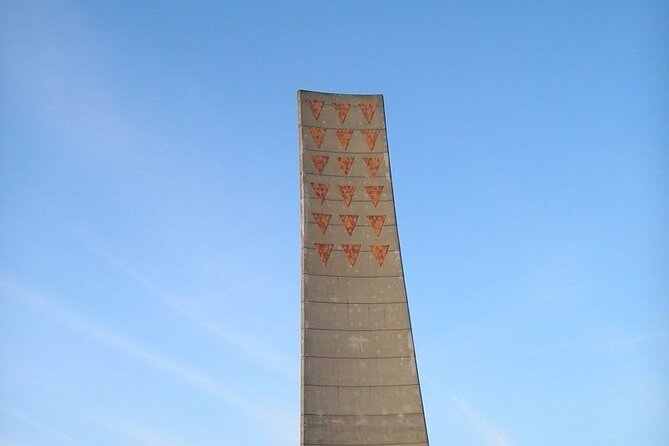
Prisoners’ stories at Sachsenhausen reveal the harrowing realities of life within the notorious concentration camp. Forced to endure brutal conditions, detainees faced relentless physical and psychological torment, with many perishing from exhaustion, starvation, and outright execution.
The guide’s narrative brings these tragic tales to life, highlighting the horrific ordeals experienced by prisoners:
- Accounts of brutal beatings and summary executions at the hands of sadistic guards
- Descriptions of overcrowded, unsanitary living quarters and inadequate nutrition leading to widespread disease and malnutrition
- Firsthand testimonies of prisoners forced into backbreaking labor, facing the constant threat of torture and death
These stories serve as a somber reminder of the profound human suffering inflicted upon the victims of the Nazi regime.
Key Sites Within the Camp
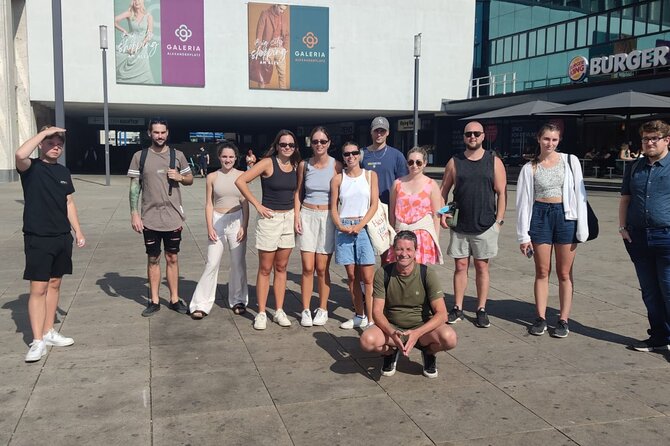
Throughout the tour, visitors explore key sites within the former Sachsenhausen Concentration Camp, including the prisoner cells, guard towers, and other significant structures that offer glimpses into the camp’s dark history.
The tour takes guests to the grim prisoner cells, where they can envision the harsh conditions endured by those imprisoned.
The imposing guard towers that once watched over the camp are also visited, symbolizing the oppressive control exerted over the inmates.
Other sites, such as the crematorium and execution grounds, provide sobering reminders of the horrors that occurred within Sachsenhausen’s walls.
Meeting Point and Tour Details
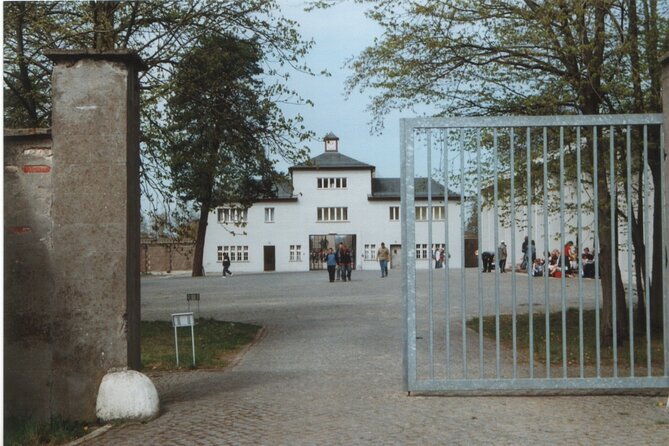
The tour meeting point is at the Generator Berlin Alexanderplatz, located at Otto-Braun-Straße 65, 10178 Berlin.
Participants will then be taken on a walking tour of the former Sachsenhausen Concentration Camp, with the tour ending back at the original meeting point.
The tour starts promptly at 10:00 am and provides:
- A professional guide to share the stories of Sachsenhausen prisoners
- Exploration of key sites around the former camp, such as prisoner cells and guard towers
- An opportunity to learn about life in the Third Reich as you walk the grounds
Confirmation of the booking is provided at the time of purchase, and a small donation of €3 per person is required to help maintain the memorial site.
Additional Tour Information
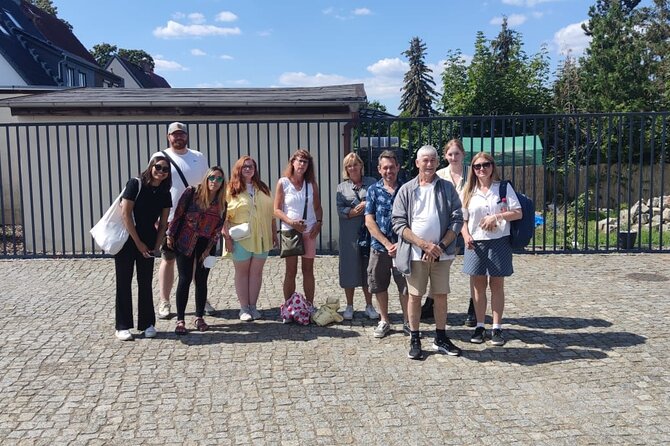
Visitors must be aware of a few important details regarding the Sachsenhausen Concentration Camp Memorial Tour. The tour is wheelchair accessible, and children must be accompanied by an adult. Plus, participants should not have any heart problems or other serious medical conditions that could prevent them from fully participating.
A donation of €3 per person is required to help maintain the memorial site. Cancellations can be made up to 24 hours in advance for a full refund, but changes less than 24 hours before the tour are not accepted.
| Accessibility | Medical Conditions | Cancellation Policy |
|---|---|---|
| Wheelchair accessible | No heart problems or serious conditions | Can cancel up to 24 hours in advance |
| Children must be accompanied | Most travelers can participate | Changes less than 24 hours not accepted |
| €3 per person donation required |
Cancellation and Refund Policy
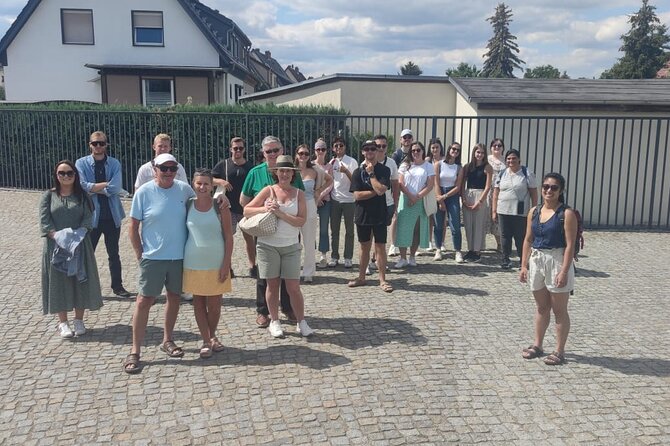
Regarding the Sachsenhausen Concentration Camp Memorial Tour, cancellations can be made up to 24 hours in advance for a full refund, but changes less than 24 hours before the tour aren’t accepted.
The cancellation policy is based on local time, so travelers should keep this in mind when planning their trip.
Some key points about the cancellation and refund policy include:
- Cancellations made 24 hours or more before the tour are eligible for a full refund.
- Changes to the booking less than 24 hours prior to the tour aren’t permitted.
- Refunds are processed according to the local time in Berlin.
Memorial Maintenance Donation
Why is a €3 per person donation required for the maintenance of the Sachsenhausen Concentration Camp Memorial? The donation helps ensure the preservation and upkeep of this important historical site. As a nonprofit organization, the Memorial relies on these funds to cover expenses like grounds maintenance, exhibit updates, and staff salaries. This allows visitors to learn about the camp’s history and honor the victims in a well-maintained environment. The donation is a small price to pay for the invaluable educational and commemorative experience the Memorial provides. Plus, it’s a tax-deductible contribution that supports an impactful cause.
| Expense | Percentage of Donation |
|---|---|
| Grounds Maintenance | 40% |
| Exhibits & Displays | 30% |
| Staff Salaries | 20% |
| Other Operational Costs | 10% |
Frequently Asked Questions
How Long Does the Tour Typically Last?
The tour typically lasts between 2 to 3 hours, during which visitors explore the former concentration camp and learn about its history from a professional guide. The duration allows enough time to see the key sites and hear the stories of the prisoners.
Are Audio Guides Available for the Tour?
Audio guides are not explicitly mentioned for this tour. The tour is led by a professional guide who provides commentary and information to participants as they explore the former concentration camp site.
Can I Take Photos During the Tour?
Participants can generally take photos during the tour, but should be respectful of the solemn nature of the site. Photography may be restricted in certain areas, so it’s best to follow the guide’s instructions.
Are There Any Age Restrictions for Children?
Children must be accompanied by an adult to participate in the tour. The tour has no specific age restrictions, though the content may not be suitable for very young children.
Is There a Dress Code for the Tour?
There is no specific dress code for the tour, but visitors should wear comfortable walking shoes and dress appropriately for the weather. No special attire is required, but visitors should be respectful of the memorial site.
Recap
The Sachsenhausen Concentration Camp Memorial Tour provides a somber and thought-provoking experience, allowing visitors to walk in the footsteps of the countless victims who suffered and perished under Nazi oppression.
By exploring the camp’s history and witnessing key sites, the tour honors the memory of those who endured the brutality of the regime, serving as a poignant reminder of the horrors of the past and the importance of vigilance against such atrocities.
More Tours in Berlin
- Berlin: 2-Hour Premium Segway Tour
- Berlin: Hidden gems around the Gendarmenmarkt – Guided walking tour
- Berlin: Guided group tour of Kreuzberg 36, the alternative district
- Tour in Berlin from Warnemünde and Rostock Cruise Port
- Berlin: Guided Street Food Tour with Tastings
- Potsdam: Original steam ship Gustav from 1908. Coal-fired, boat tour
More Tour Reviews in Berlin
Not for you? Here's more things to do in Berlin we have recnetly reviewed
- Potsdam: 5-Hour-Tour “Parks & Palaces” from Berlin by VW-Bus
- Berlin: guided canoe | kayaktour
- Berlin: 3-Hour Guided Small Group Fat Tire E-Scooter Tour
- Rickshaw private driver, shared Guide Berlin Highlights
- Berlin: Madame Tussauds Happy Hour Ticket
- Berlin: Green City Guided Bike Tour
- VIP Warnemünde-Berlin: Private Shore Excursion with a Van
- Understanding Kreuzberg: The roots of local (sub)culture
- Tranfer with small or Bigger introduction Tour Berlin
- Private Tour – Highlights of Berlin for Families
- Berlin: Germany’s Very first Craft Beer Tour and Experience
- Private Highlights of Berlin Bike Tour
